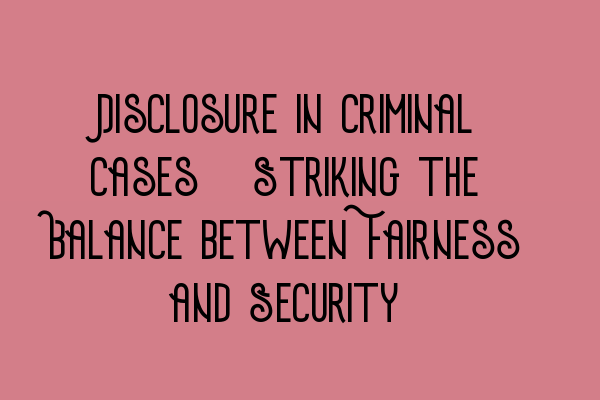Disclosure in Criminal Cases: Striking the Balance between Fairness and Security
Disclosure plays a crucial role in criminal cases, ensuring that all parties involved have access to relevant evidence. It is a fundamental principle of our legal system that both the prosecution and the defense are entitled to a fair trial. This requires disclosure of all material that may assist the defense or undermine the prosecution’s case. However, there is a delicate balance to be struck between fairness and security.
Disclosure obligations are enshrined in the Criminal Procedure and Investigations Act 1996 and the Attorney General’s Guidelines on Disclosure. These rules govern how the prosecution must disclose material to the defense, as well as the defense’s obligations to disclose their own evidence. The aim is to ensure that all relevant information is available, allowing the parties to build their cases and present their arguments effectively.
The Importance of Fairness in Disclosure
Fairness is at the heart of our criminal justice system. Every individual accused of a crime deserves a fair trial and the opportunity to challenge the evidence presented against them. A failure to disclose material that may assist the defense can undermine the integrity of the whole process, potentially leading to wrongful convictions.
One key consideration in the disclosure process is the concept of “unused material.” This refers to material that is not being relied upon by the prosecution but may still be relevant to the defense. The defense must be made aware of this material so that they can use it to strengthen their case or challenge the credibility of prosecution witnesses.
In recent years, there have been high-profile cases where failures in disclosure have come to light, resulting in miscarriages of justice. These cases have highlighted the importance of robust systems and procedures to ensure effective disclosure, preventing wrongful convictions and preserving public trust in the criminal justice system.
The Challenge of Security and Sensitivity
While fairness is paramount, there are also legitimate concerns around security and sensitivity when it comes to disclosure. In certain cases, the material in question may be sensitive or pose a risk to national security. Striking the right balance between disclosure and the need to protect individuals and sensitive information is crucial.
This challenge is particularly evident in cases involving national security, terrorism, or organized crime. The authorities must carefully assess the risks and potential harm associated with certain materials before deciding on what can be disclosed and to whom. They must ensure that the disclosure process neither jeopardizes ongoing investigations nor compromises the safety of individuals involved.
It is for this reason that disclosure decisions are often subject to review by independent bodies such as the Crown Prosecution Service (CPS) and the Independent Reviewer of Terrorism Legislation (IRTL). These bodies provide an additional layer of oversight and ensure that disclosure decisions are robust and fair.
Adapting to the Digital Age
The digital age has presented new challenges and opportunities in the disclosure process. In today’s world, vast amounts of data can be stored and shared electronically, making it both easier and more complex to navigate. Technology has the potential to streamline the disclosure process, but it also requires adapting existing rules and practices to accommodate the digital landscape.
With the rise of social media and encrypted communications, accessing relevant evidence has become more complex. It is now necessary to apply modern investigative techniques to uncover digital evidence. This includes data retrieval, analysis, and ensuring that appropriate tools and expertise are available to handle digital material.
The Way Forward
The balance between fairness and security in disclosure is an ongoing challenge. It requires constant review, adaptation, and collaboration between legal professionals, law enforcement agencies, and experts in digital forensics. The goal is to maintain the highest standards of fairness while protecting sensitive information and ensuring security.
At SQE Criminal Law & Practice Law UK, we understand the complexities of disclosure in criminal cases. Our team of expert solicitors is dedicated to upholding the principles of fairness and security in the criminal justice system. We offer comprehensive SQE 1 and SQE 2 preparation courses, as well as invaluable resources like SQE 1 Practice Exam Questions and SQE 1 Practice Mocks FLK1 FLK2 to help aspiring legal professionals navigate the intricacies of criminal law.
For more information about SQE exam dates and our range of SQE preparation courses, visit our website.
